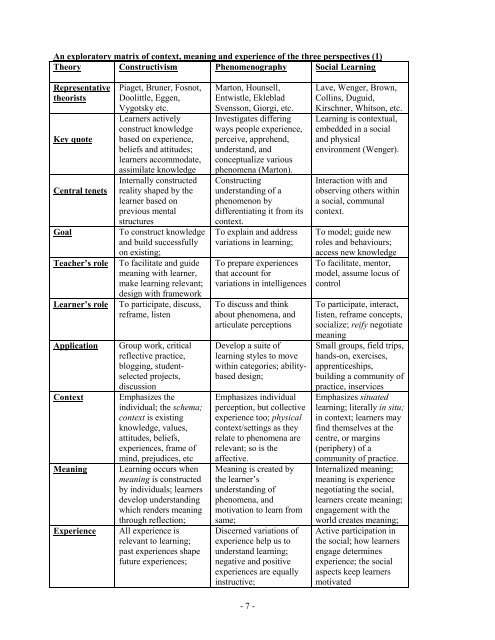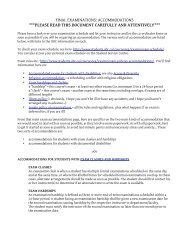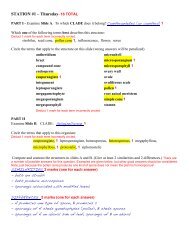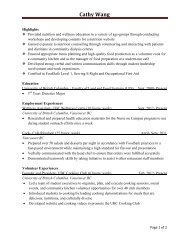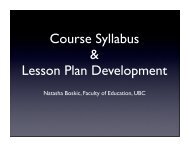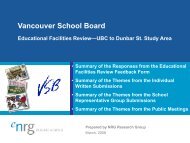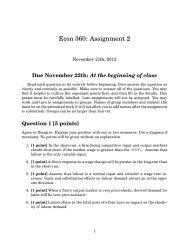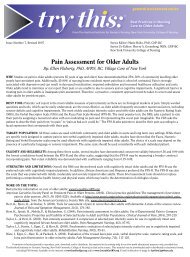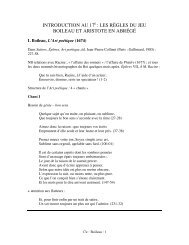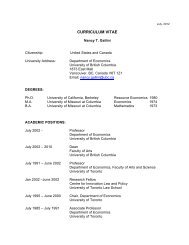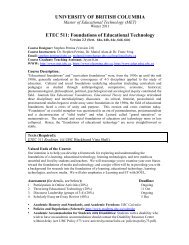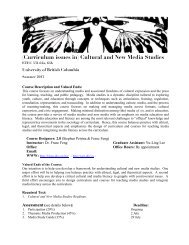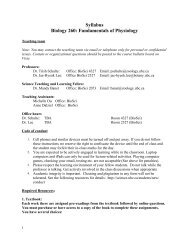adult learning theories - UBC Blogs - University of British Columbia
adult learning theories - UBC Blogs - University of British Columbia
adult learning theories - UBC Blogs - University of British Columbia
- No tags were found...
You also want an ePaper? Increase the reach of your titles
YUMPU automatically turns print PDFs into web optimized ePapers that Google loves.
An exploratory matrix <strong>of</strong> context, meaning and experience <strong>of</strong> the three perspectives (1)Theory Constructivism Phenomenography Social LearningRepresentativetheoristsKey quoteCentral tenetsGoalTeacher’s roleLearner’s roleApplicationContextMeaningExperiencePiaget, Bruner, Fosnot,Doolittle, Eggen,Vygotsky etc.Learners activelyconstruct knowledgebased on experience,beliefs and attitudes;learners accommodate,assimilate knowledgeInternally constructedreality shaped by thelearner based onprevious mentalstructuresTo construct knowledgeand build successfullyon existing;To facilitate and guidemeaning with learner,make <strong>learning</strong> relevant;design with frameworkTo participate, discuss,reframe, listenGroup work, criticalreflective practice,blogging, studentselectedprojects,discussionEmphasizes theindividual; the schema;context is existingknowledge, values,attitudes, beliefs,experiences, frame <strong>of</strong>mind, prejudices, etcLearning occurs whenmeaning is constructedby individuals; learnersdevelop understandingwhich renders meaningthrough reflection;All experience isrelevant to <strong>learning</strong>;past experiences shapefuture experiences;Marton, Hounsell,Entwistle, EklebladSvensson, Giorgi, etc.Investigates differingways people experience,perceive, apprehend,understand, andconceptualize variousphenomena (Marton).Constructingunderstanding <strong>of</strong> aphenomenon bydifferentiating it from itscontext.To explain and addressvariations in <strong>learning</strong>;To prepare experiencesthat account forvariations in intelligencesTo discuss and thinkabout phenomena, andarticulate perceptionsDevelop a suite <strong>of</strong><strong>learning</strong> styles to movewithin categories; abilitybaseddesign;Emphasizes individualperception, but collectiveexperience too; physicalcontext/settings as theyrelate to phenomena arerelevant; so is theaffective.Meaning is created bythe learner’sunderstanding <strong>of</strong>phenomena, andmotivation to learn fromsame;Discerned variations <strong>of</strong>experience help us tounderstand <strong>learning</strong>;negative and positiveexperiences are equallyinstructive;Lave, Wenger, Brown,Collins, Duguid,Kirschner, Whitson, etc.Learning is contextual,embedded in a socialand physicalenvironment (Wenger).Interaction with andobserving others withina social, communalcontext.To model; guide newroles and behaviours;access new knowledgeTo facilitate, mentor,model, assume locus <strong>of</strong>controlTo participate, interact,listen, reframe concepts,socialize; reify negotiatemeaningSmall groups, field trips,hands-on, exercises,apprenticeships,building a community <strong>of</strong>practice, inservicesEmphasizes situated<strong>learning</strong>; literally in situ;in context; learners mayfind themselves at thecentre, or margins(periphery) <strong>of</strong> acommunity <strong>of</strong> practice.Internalized meaning;meaning is experiencenegotiating the social,learners create meaning;engagement with theworld creates meaning;Active participation inthe social; how learnersengage determinesexperience; the socialaspects keep learnersmotivated- 7 -


